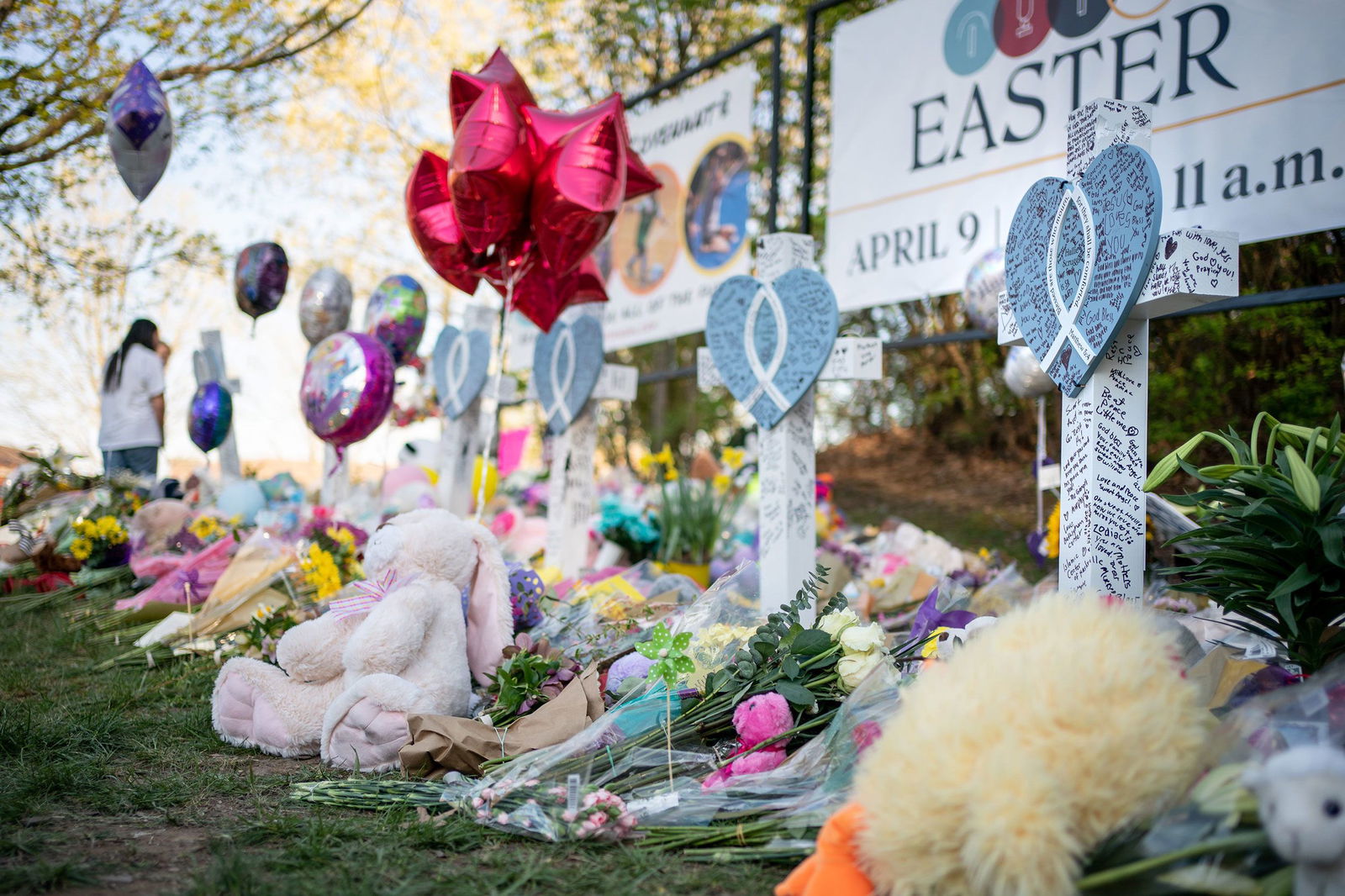How The Covenant School shooter planned the deadly attack for years while manipulating parents and therapists

Audrey Hale
By Ray Sanchez, CNN
(CNN) — The 28-year-old who gunned down three third graders and three staff members at The Covenant School in Nashville “used a great deal of manipulation” to conceal the extent of her mounting mental health struggles from her parents and therapists for years while planning a mass shooting, a police investigative report said.
Bent on infamy and obsessed with mass killings and school shootings, Audrey Hale extensively chronicled her grievances against her parents and others she blamed for her fraught life as she stocked up on firearms and meticulously prepared for the March 27, 2023, massacre, according to the 48-page report released Wednesday.
“She used a great deal of manipulation to convince those she interacted with she wasn’t a threat to anyone, including herself,” said the report, which described Hale as female though the killer “identified as a male and used he/him as preferred pronouns” on social media.
“As Hale was a biological female at the time of her death and throughout the incidents described in this summary and in the case file, Hale will be referred to as a female,” the report said.
After two years of interviews and examinations of Hale’s digital devices, online accounts, video tapes, medical records and artwork and writings across 1,299 pages of notebooks, investigators found no culpability on the part of family members, therapists or the retailers who sold her guns in the years before the carnage at the private Christian school.
“She regularly manipulated others into giving her what she wanted, and she railed against those who saw through the manipulation,” the report said.
Hale, who investigators said acted alone, was gunned down by police shortly after the deadliest school shooting in Tennessee history – the planning of which was laid out in great detail in the volumes of evidence she left behind, including journal entries dating to 2017.
“In this case, the amount of information Hale left behind was far more than is usually available in a criminal investigation,” the investigative summary said. “Considering the materials she left behind spanned several years, detectives were offered an opportunity to examine Hale’s life in far more detail than many other offenders.”
‘A deranged, selfish, evil individual’
In the report, the Metropolitan Nashville Police Department said Hale – based on available records – was sane but evidence pointed to worsening anxiety, depression and rage that she managed to withhold from her family and mental health professionals over the years.
In the years before the attack, Hale’s parents assisted their child “with obtaining mental healthcare despite them not being legally required to do so,” police said in a statement. And “Hale chronicled how she withheld information from providers to prevent her from being stopped.”
Families of the victims, including children who were at the school the day of the shooting, in a statement described the findings as “bleak.”
“This report summarizes the reality we’ve been living with, that this was truly a senseless crime committed by a deranged, selfish, evil individual who relished the killing of innocent children,” the statement read.
Hale’s writings were filled with references to her mental health struggles, which she said began at a young age, according to police. Hale wrote she was “sensitive to loud noises and was easily frightened by large groups of children, large animals, and adults.”
“Even though these recollections were written after Hale reached adulthood and therefore must be taken with a grain of salt due to the difference in time, one thing which was certainly documented was her mental health history, which began in 2001 when Hale was six years of age,” the report said.
Her mother noticed developmental delays in Hale early on and believed she was autistic, the report said. She took the child to a mental health professional, who determined that “Hale did have certain developmental delays, particularly in asserting herself in social situations, emotional processing, and indicators of anxiety.” But no signs of autism spectrum disorder were found.
Hale attended The Covenant School in the early 2000s, from kindergarten through fourth grade – years she considered “the happiest of her childhood,” the report said. She felt “safe and accepted,” enjoyed “a positive relationship” with her family and “showed a proclivity for art.”
Columbine was ‘true source of inspiration’
In 2006, Hale transferred to a magnet school where she was able to pursue her interest in art. Unlike the predominantly White and affluent Covenant School, the middle school had a more diverse student body from working-class households, the report said. Hale wrote that she was bullied at first, and “she began to feel socially ostracized, which lowered her self-esteem and self-confidence.”
Her outlook changed somewhat in the seventh grade when Hale made the basketball team. She found her teammates accepting and welcoming – which boosted her self-esteem and confidence. She viewed some teammates as “best friends,” the report said, but that experience was short-lived as most of her closest teammates moved on to high school. Her low self-esteem came back, this time tinged with anger, the report said.
In high school, at the Nashville School of the Arts, Hale reconnected with some former basketball teammates but learned they had “developed new interests and social circles.” Her increasing isolation and self doubt affected her grades and “she first began to contemplate committing suicide,” according to the report.
In 2011, Hale’s mother again took her to a therapist. A psychological assessment found that Hale “suffered from major depressive disorder, dysthymic disorder, generalized anxiety disorder, social phobias, anger-management issues, and was underdeveloped both emotionally and socially.” She began therapy and for a time managed her conditions with medications.
After high school, Hale attended the Nossi College of Art & Design at the insistence of her mother. She remained isolated from her former teammates and others. She attended an eating disorder clinic amid concerns over her weight loss. Hale “remained lonely” and grew more resentful of ex-teammates she felt had “abandoned her,” the report said.
“Her isolation and loneliness led Hale to begin believing the only true friends she could confide in were her stuffed animals, who she felt would never abandon her,” said the report, noting she assigned them names and personalities and traveled with them.
Over time, Hale moved from documenting “her romantic longings, anger, isolation, and deepening depression” in her notebooks to writing expletive-filled “rage storms” against her father and other topics that angered her, according to the report. Starting in the fall of 2017, while in college, Hale began researching school shootings and mass killers.
She developed a particular affinity and fascination with Eric Harris and Dylan Klebold, the teen gunmen who killed 13 people at Columbine High School in Littleton, Colorado. The 1999 massacre has been cited as an inspiration for other school shooters in the decades since. The notoriety following their deaths, she wrote, turned them into “gods.”
“She kept returning to Columbine as her true source of inspiration,” the report said.
Hale denied plans to harm others
Hale often wrote about the level of secrecy needed to carry out an attack, including withholding information from therapists, taking steps to delete browsing history, and concealing guns and ammunition, police said.
Her rage, loneliness and low self-esteem occasionally surfaced “despite Hale’s best efforts to control her inner turmoil,” the report said.
“This led to situations where her parents and therapists sought more intensive treatments to manage her assorted mental health disorders, including partial hospitalization programs. These methods ultimately failed to successfully treat Hale, though it can be said this was due to Hale herself not wanting to be treated. Instead, these attempts led Hale to becoming very paranoid, more secretive, and to further self-isolate herself from the world. This also led to Hale becoming more manipulative towards her parents and therapists as time progressed.”
Despite her mental health disorders, investigators said, Hale was “certainly sane” and capable of adjusting her plans as needed and duping others “into seeing her as meek and nonthreatening.”
“She was careful to avoid paying for anything related to the attack on her credit or debit cards, as she knew her mother had access to her account and could see how she was spending money,” the report said.
As her chronic loneliness and disappointment deepened, the report said, Hale began to crave notoriety and “sought to become a ‘god’ like Harris and Klebold by killing victims nobody would forget: children.”
In 2019, Hale let slip to her therapist “she had suicidal ideations and homicidal fantasies, though she was quick to explain she didn’t have a plan for either.” That prompted another psychological assessment that summer, with the specialists identifying “her depression and anxiety as the largest aggravating factors” and noting that “Hale denied having any plans to harm herself or others, nor the means to do so,” according to the report. At her mother’s urging, Hale completed an eight-week intensive outpatient program. Her condition seemed to improve for a time but Hale soon “sunk back into deep rage and despair,” as well as suicidal ideations.
In the fall of 2020, Hale began visiting firearm retailers and planning how to hide weapons and ammunition from her parents in her bedroom. She made the first of several gun purchases in October of that year. She also bought ammunition and a gun sock to store the weapon in her closet, the report said.
After Hale’s mother found the wrapper for the gun sock in the trash, she admitted buying a rifle.
“Her mother immediately objected to the rifle due to Hale’s history of depression and suicidal fantasies, but her father stated he had no problem with Hale having a firearm provided she take classes to learn how to use the rifle safely and responsibly,” the report said. “Hale’s mother begrudgingly agreed, and Hale kept the rifle.”
In April 2021, Hale told a therapist that she owned a rifle. Hale wrote that she “managed to assure her therapist those fantasies were well in her past and she was no longer in danger of harming herself,” according to the report.
“Hale chided herself for losing control and letting slip proof of her ‘true intentions.’ She was determined to be more careful in the future regarding how much others would know about her plans. After this, she took more precautions to hide the ammunition and equipment she was stockpiling for the attack, along with her writings and ‘research materials’ she compiled to prepare for the attack.”
Hale’s mother then learned she purchased online a copy of the book “The Columbine Diaries.” The discovery in the summer of 2021 led to a meeting with her parents and therapist where “homicidal fantasies towards her father” came to light, the report said. Hale agreed to turn her weapons over to her parents. She also had another psychological assessment but wasn’t hospitalized. And Hale acquired another firearm – a semiautomatic pistol.
‘No facts can lessen the trauma and grief’
Hale began to see a new therapist and, in July 2021, her firearms were returned to her on the condition that she agree to sell them. Hale sold two of the five firearms she possessed at that time, the report said.
“The temporary loss of the firearms made Hale determined to be more careful going forward,” said the report. She decided to purchase weapons that were easier to conceal and rented firearms at the gun range instead of bringing her own. Over time, Hale changed the date and location of her planned attack for various reasons, according to the report.
She initially intended to target her former middle school but ultimately decided on Covenant in part because she didn’t want to be viewed as racist – “which would affect how much control she had over the narrative after her death,” the report said.
In the coming months, Hale postponed her attack a number of times, deciding she needed additional firearm training to make her more proficient, the report said. She also believed that waiting would help convince her parents there was nothing to be concerned about.
At one point Hale visited The Covenant School and, during a tour, took photos and videos she used to map out the building. For a time she considered attacks at other locations, including shopping malls and public spaces.
In May 2022, she postponed the Covenant attack to attend her college graduation. In the months before the massacre, the report said, Hale became more and more paranoid, worried her parents or therapist would learn about her plans. She “chided herself about being more careful.”
Ultimately, just after 10 a.m. on March 27, 2023, Hale slung two firearms around her neck and shoulders and entered The Convenant School to carry out the shooting.
CNN has reached out to the school and Hale’s parents for comment about the report’s findings.
In their statement Wednesday, the families of the Nashville victims said, “There would never be closure after a crime like this. No words can diminish the depths of loss we feel without Evelyn, Hallie, William, Mike, Katherine, and Cindy.”
The shooter killed three 9-year-olds: Evelyn Dieckhaus, Hallie Scruggs and William Kinney. Three adults were also fatally shot: Mike Hill, the school custodian; Katherine Koonce, the head of the school; and substitute teacher Cynthia Peak.
“No facts can lessen the trauma and grief we have been bearing the past two years,” the statement read. “We hope no one else ever has to go through this.”
Last July, a Tennessee judge ruled that Hale’s writings could not be released to the public. The killer’s parents inherited the writings and transferred ownership to the victims’ families, whose lawyers argued that releasing them would lead to further trauma and inspire copycat attacks.
Eric Osborne, an attorney representing some of the victims’ families, said the findings establish “beyond a doubt that our legal battle against the public release of the shooter’s evil material is just, appropriate, and should silence any critics of our efforts.”
“Please remember that there are real children and families who are suffering and who will never be the same,” Osborne said in a statement. “Keep your focus on the victims and survivors of that horrific day.”
Nashville police agreed, acknowledging in a statement that “Hale’s specific action plan, if ever made public, would be used by future potential mass murderers in the United States or anywhere in the world to attack and kill innocent persons, including school children.”
The-CNN-Wire
™ & © 2025 Cable News Network, Inc., a Warner Bros. Discovery Company. All rights reserved.
CNN’s Holly Yan, John Miller and Karina Tsui contributed to this report.


